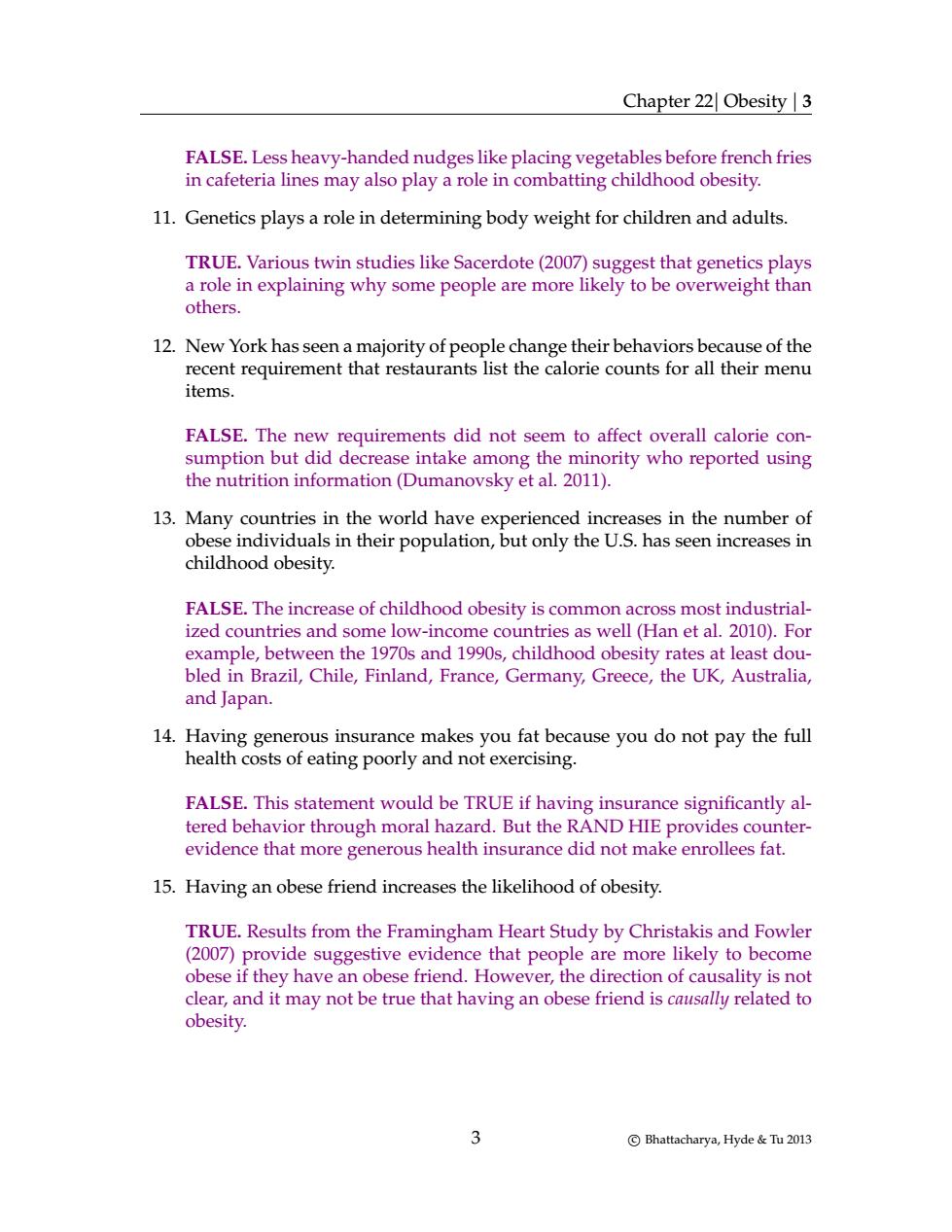正在加载图片...

Chapter 22 Obesity 3 FALSE.Less heavy-handed nudges like placing vegetables before french fries in cafeteria lines may also play a role in combatting childhood obesity. 11.Genetics plays a role in determining body weight for children and adults. TRUE.Various twin studies like sacerdote(2007)suggest that genetics plays a role in explaining why some people are more likely to be overweight thar others. 12.New York has seen a majority of people change their behaviors because of the recent requirement that restaurants list the calorie counts for all their menu items FALSE.The new requirements did not seem to affect overall calorie con- sumption but did decrease intake among the minority who reported using the nutrition information(Dumanovsky et al.2011). 13.Many countries in the world have experienced increases in the number of obese individuals in their population,but only the U.S.has seen increases in childhood obesity. FALSE.The increase of childhood obesity is common across most industrial- s and s e low-in s a well (Han et al.2010).For en the 1970: obesity rat t least dou bled in Brazil,Chile,Finland,France,Germany,Greece,the UK,Austral and Japan. 14.Having genero ous insuranc e make es you fat because you do not pay the full health costs of eating poorly and not exercising. FALSE.This statement would be TRUE if having insurance significantly al- tered behavior through moral hazard.But the RAND HIE provides counter- evidence that more generous health insurance did not make enrollees fat. 15.Having an obese friend increases the likelihood of obesity. TRUE.Results from the Framingham Heart Study by Christakis and Fowler (2007 ese friend.Ho ore likely to becom eve ali clear,and it may not be true that having an obese friend is causally related to obesity. 3 Bhattacharya,Hyde &Tu013Chapter 22| Obesity | 3 FALSE. Less heavy-handed nudges like placing vegetables before french fries in cafeteria lines may also play a role in combatting childhood obesity. 11. Genetics plays a role in determining body weight for children and adults. TRUE. Various twin studies like Sacerdote (2007) suggest that genetics plays a role in explaining why some people are more likely to be overweight than others. 12. New York has seen a majority of people change their behaviors because of the recent requirement that restaurants list the calorie counts for all their menu items. FALSE. The new requirements did not seem to affect overall calorie consumption but did decrease intake among the minority who reported using the nutrition information (Dumanovsky et al. 2011). 13. Many countries in the world have experienced increases in the number of obese individuals in their population, but only the U.S. has seen increases in childhood obesity. FALSE. The increase of childhood obesity is common across most industrialized countries and some low-income countries as well (Han et al. 2010). For example, between the 1970s and 1990s, childhood obesity rates at least doubled in Brazil, Chile, Finland, France, Germany, Greece, the UK, Australia, and Japan. 14. Having generous insurance makes you fat because you do not pay the full health costs of eating poorly and not exercising. FALSE. This statement would be TRUE if having insurance significantly altered behavior through moral hazard. But the RAND HIE provides counterevidence that more generous health insurance did not make enrollees fat. 15. Having an obese friend increases the likelihood of obesity. TRUE. Results from the Framingham Heart Study by Christakis and Fowler (2007) provide suggestive evidence that people are more likely to become obese if they have an obese friend. However, the direction of causality is not clear, and it may not be true that having an obese friend is causally related to obesity. 3 c Bhattacharya, Hyde & Tu 2013